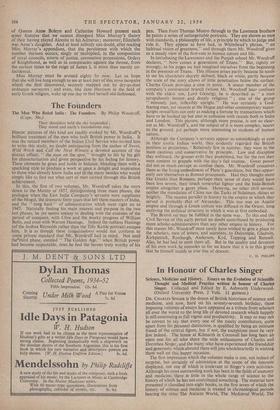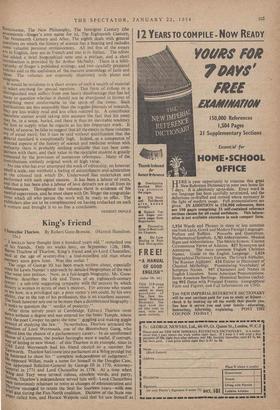In Honour of Charles Singer
Science, Medicine and History. Essays on the Evolution of Scientific Thought and Medical Practice written in honour of Charles Singer. Collected and Edited by E. Ashworth Underwood. (Oxford University Press, 2 Vols. 11 guineas.) DR. CHARLES SINGER is the doyen of British historians of science and medicine, and now, hard on his seventy-seventh birthday, these imposing volumes of essays have appeared as a tribute from scholars all over the world to the long life of devoted research which happily is still continuing in full vigour and productivity. It may or may not be correct to say that every one of the ninety contributors, quite apart from his personal distinction, is qualified by being an intimate friend of the central figure, but if not, the exceptions must be very few indeed. The house at Kilmarth in Cornwall has long been On open one for all who share the wide enthusiasms of Charles and Dorothea Singer, and the many who have experienced the friendship and generosity which abound there will join wholeheartedly in wishing them well on this happy occasion.
The first impression which the volumes make is one, not indeed of surprise, but certainly of admiration at the scope of the interests displayed, not one Of which is irrelevant to Singer's own activities. Although his most outstanding work has been in the fields of anatomy and medicine, there is little in the whole range of science to the history of which he has not contributed something. The material here presented is classified into eight books, in the first seven of which the history of science and medicine is treated in chronological periods bearing the titles The Anbient World, The Medieval World, The Renaissance, The New Philosophy, The Insurgent Century (the seventeenth—Singer's own name for it), The Eighteenth Century,
The Nineteenth Century and After. The eighth deals with general questions on which the history of science has a bearing and includes some valuable personal reminiscences. All but five of the essays are in English, four are in French and one is in Italian. The editor
has added a brief biographical note and a preface, and a short introduction is provided by Sir Arthur McNalty. There is a bibli- d. graPhy of Singer's published writings, and two carefully prepared indexes add to the usefulness of the massive assemblage of facts and ideas. The volumes are copiously illustrated with plates and diagrams.
It would be invidious in a short review of such a wealth of material to select anything for special mention. This form of tribute to a distinguished man suffers from one heavy disadvantage that has led many to question whether it should not be abandoned in favour of something more conformable to the spirit of the times. Such Publications are less accessible than the regular journals of research, they arc less widely read and less often referred to. A contributor therefore cannot avoid taking into account the fact that his essay may be, in a sense, buried, and there is thus. an inevitable tendency for him to supply what he regards as his less important work. It Would, of course, be false to suggest that all the essays in these volumes are of equal merit, but it can be said without qualification that the general standard is exceptionally high. indeed, as a conspectus of selected aspects of the history of science and medicine written with authority there is probably nothing available that can bear com- parison with them, and their value to the sivcialist student is greatly enhanced by the provision of numerous references. Many of the contributions embody original work of high value. No one who has ever attempted the work of editorship, on however small a scale, can withhold a feeling of astonishment and admiration at the colossal task which Dr. Underwood has undertaken and Performed with such signal success. It has been a labour of years, and that it has been also a labour of love detracts not at all from its laboriousness. Throughout the volumes there is evidence of his careful supervision, and he must share with Dr. Singer the congratula- tions which all who peruse the work will be ready to offer. The Publishers also are to be complimented on having embarked on such a venture and brought it to so fine a conclusion. • HERBERT DINGLE



































 Previous page
Previous page